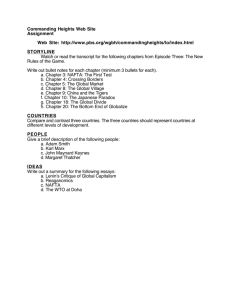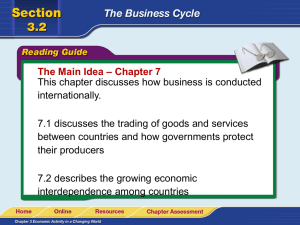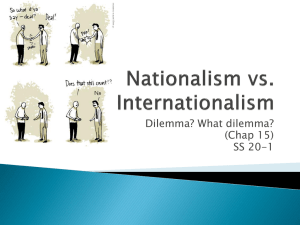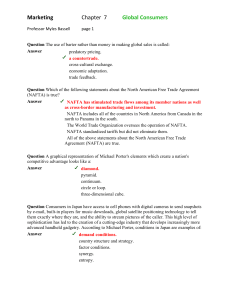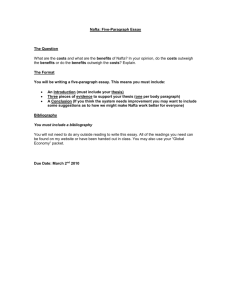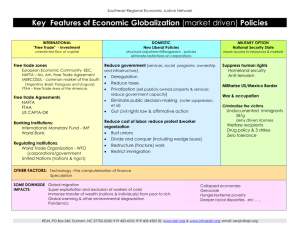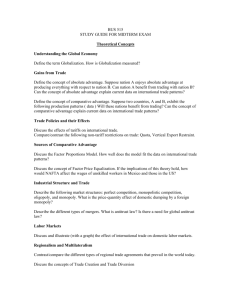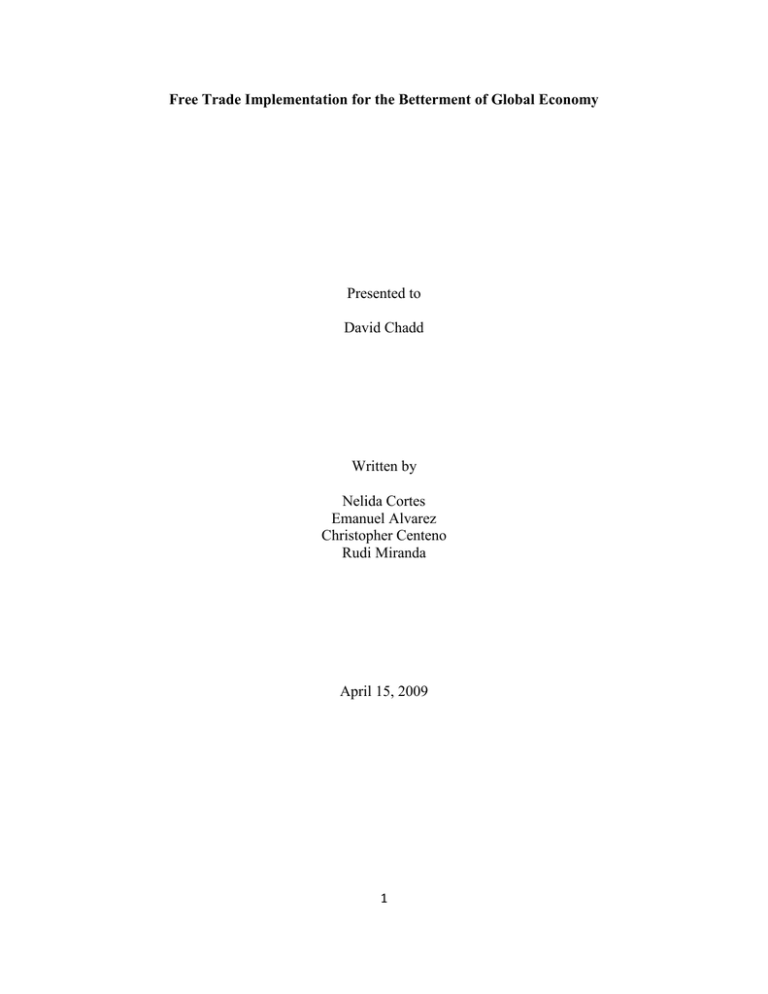
Free Trade Implementation for the Betterment of Global Economy
Presented to
David Chadd
Written by
Nelida Cortes
Emanuel Alvarez
Christopher Centeno
Rudi Miranda
April 15, 2009
1
REPORT CONTENTS
Content
Page
Executive Summary …………………………………………………………………………….3
NAFTA Case……………………………………………………………………………………5
Free Trade ………………………………………………………………………………………6
Protectionist Point ………………………………………………………………………………7
Report Bibliography …………………………………………………………………………... 10
2
EXECUTIVE SUMMARY
The title of the report is, “Free Trade Implementation for the Betterment of Global
Economy”
Thesis
The essay will discuss the strengths of free trade, by focusing on current and past
successes in the economic world, while at the same time viewing failures that have occur in
business in the US economy and its’ effects around the world.
Free Trade
This section provides information that argues towards the establishment of regulatory
practices that benefit global free trade.
Protectionist Point
Information from opposing viewpoints to free trade is presented in this section of the
report.
NAFTA Case
The section of the reports explains through current free trading agreements that free trade
benefits global free trade.
3
Free Trade Implementation for the Betterment of Global Economy
Free trade, a trade policy that allows traders to act and transit without interference from
government, has been the most success alliance and agreement when it comes to trade by
studying closely the results of North American Free Trade Agreement between The United
States of America, Mexico and Canada. The North American Free Trade Agreement (NAFTA) is
a trilateral Trade bloc (is a type of intergovernmental agreement, often part of a regional
intergovernmental organization, where regional barriers to trade ,tariffs and non-tariff barriers,
are reduced or eliminated among the participating states) in North America created by the
governments of the United States, Canada, and Mexico. In 2007 the United States Department
Agricultural reported that “Canada and Mexico were, respectively, the first and second largest
export markets for U.S. agricultural products. Exports to the two markets combined were greater
than exports to the next six largest markets combined.” This clearly illustrates its success. More
importantly, the combination of both markets exceeded the amount of Exports of the next six
biggest markets as a whole in comparison. In the following essay, it will be shown how free
trade has proven to be the superior choice for the trade of goods among countries, compared to
the option of fair trade, which an organized social movement and market-based approach to
empowering developing country producers and promoting sustainability. Due to modern
technological advances worldwide, globalization of businesses has become a common
occurrence among government; private, public, nonprofit organizations and their home countries.
Such, phenomenons have forced countries to form economic unions or alliances among countries
to maintain a competitive edge over the competition. By entering such organizations, countries
are hoping to gain an advantage or at least improve their economy through trade agreements. For
example some of the alliances and trade agreements that countries have entered to possibly
improve their economic chances are the North American Free Trade Agreement, the World
Trade Organization, the European Union and Federal Republic of Central America. First, the
essay will discuss the strengths of free trade, by focusing on current and past successes in the
economic world, while at the same time viewing failures that have occur in business in the US
economy and its effects around world. Second, in the assay arguments against free trade will be
analyzed and critically refuted by using facts and philosophies support the free trade movement.
4
Finally, the essay will conclude with a summation of the facts that determine how free trade is
the superior choice for the trade of good among individuals and countries worldwide.
NAFTA has specific standards for counties that import and export products. These
imposed standards enforce sanitary measures. These measures have been established to protect
human, animal and plant life. This will ensure a risk free animal and plant products from plant
pests or diseases. The organization responsible for these measures is the Sanitary and
Phytosanitary (SPS) they set up regulations that restrict trade and ensures the counties rights to
protect consumers from unsafe products. SPS also secures crop yields, and livestock
(fas.usda,2009).The disadvantage of SPS is that NAFTA encourages trading partners to adopt
international and regional standards, but each county makes it own rules on how flexible to
permit each country to set more stringent standards, as long as they are scientifically based.
NAFTA efforts to balance the situations by allowing state and local governments with in
counties to enact higher or lessen standards to better suit their stringent to help adopt their
system. “These adoptions can be at the national level or so long as these standards are
scientifically defensible and are administered in a forthright, expeditious manner” (
fas.usda,2009).SPS ensure free trade by creating guidelines, regulations, trade restrictions, and
securing crop yields. This helps support and encourages free trade by making it safe and secure
for countries trade products free from harmful conditions of unregulated trade. Free trade makes
it possible for an organization like the SPS to regulate products for consumer consumption.
In the United States the majority of agriculture products have been exported to our
partners in NAFTA result in economic benefits. “From 1992-2007, the value of U.S. agricultural
exports worldwide climbed 65 percent; Over that same period, U.S. farm and food exports to our
two NAFTA partners grew by 156 percent…. Canada and Mexico export to more than the six
largest markets in the world” (fas.usad, 2009). Since the birth of NAFTA its growth has been
exponential. Records help to illustrate prior to NAFTA, U.S. agricultural products less
competitive to Mexico as for the Mexican market increased (fas.usad, 2009). A perfect example
would be Mexico from the United States Department of Agriculture: “It estimated that U.S. farm
and food exports to Mexico exceeded $11.5 billion in 2007 -- the highest level ever under
NAFTA. From 2001 to 2006, U.S. farm and food exports to Mexico climbed by $3.6 billion to
$10.8 billion. U.S. exports of soybean meal, red meats, and poultry meat all set new records in
2006”. This endless trend ended when NAFTA was enacted. NAFTA established a natural
5
competition based on regulations and rules that must be met by the counties involved. NAFTA
supports the free trade by establishing a system that is faire and protects its partners.
Milton Friedman supports the idea of free trade clearly in the article “THE CASE FOR
FREE TRADE” (Free Republic.2004) Friedman states that freedom cannot be forced to a county
but it can be made attractive. This attractiveness will offer full cooperation that makes it free
from tariffs or other restrictions. The message can be said to read “Sell here what you can and
wish to” (Free Republic.2004). In that way cooperation among individuals can be worldwide and
free. This supports the main idea of free trade to support the economic growth of free trade. The
United States, Canada, Mexico follow guidelines established through NAFTA to help eliminate
export subsidies. They do not buy or sell products to countries that produce products that
counter act their market. Only under extreme situations for example; the United States and
Canada provide export subsidies into the Mexican market, under certain conditions, to counter
subsidized exports from other countries, only then it is acceptable. Canada and the United States
are trying to capture the interests countries to produce products attractive but not conflictive of
the regulations to enforce NAFTA rules and regulations.
To review, according to Merriam Webster dictionary, free trade is based on the
unrestricted international exchange of goods with tariffs used only as a source of revenue. The
main reason to work towards free trade is not fear of retaliation, but what is gained by it,
disregarding other countries’ actions (Altschiller, 1988). Free distribution of resources provides
not just the benefit to establish positive international relations with other countries but, also
provides the opportunity to flourish as a nation. Based on Ricardo’s insight regarding distribution
of resources that we do best. Perhaps the most important of his contributions was the theory of
comparative advantage. Comparative advantage provides a fundamental argument in favor of
free trade among countries and of specialization among individuals. In addition, Ricardo’s
comparative advantage theory is closely related to Philosopher John Stewart Mill’s theory on the
greatest good for the greatest number. David argued that countries benefited from exchange even
if one party is more productive in every possible area than its trading counterpart, as long as each
concentrates on the activities where it has relative productivity advantage (UN Chronicle, 2004).
Practically political economist David Ricardo proposed that in terms of well-being, economies
would be better off than if countries isolated themselves and tried to do everything on their own.
6
Protectionists argue that fair trade should be established because it provides for the
benefit of the domestic economy. However, according to economist Milton Friedman states “A
corporation is an artificial person and in this sense may have artificial responsibilities, but
“business” as a whole cannot be said to have responsibilities, even in this vague sense”. In fact,
Friedman statement implies that businesses do not have responsibilities. Therefore, it is not the
responsibility of businesses to secure the domestic economy. More important, the principal
motive for protection is defensive---to protect sectional income levels from decline---and it is
natural that when demand for the products of a country’s industries falls, commercial policy
should try to reduce or exclude foreign competition (Altschiller, 1988). Yet, implementation of
protectionist practices causes an increase in the standard cost of living of a domestic economy. In
addition, such practices contribute to a slowdown on global economic growth. The amount of
products entering an economy decreases the prices within the domestic economy and the
increase affects individuals inside the domestic economy. In contrast, James Bacchus from the
Wall Street Journal states that free trade means broader consumer choices and lower consumer
prices. Initiative, incentive, innovation, and efficiency are inspired by competition.
Notably, the best insurance against protectionism is macroeconomic stimulus. According
to the Economist “Boosting demand at home will reduce the temptation to divert it from abroad”.
In our basic Economics courses are explained the possible ways in which the government can
boost economic growth within domestic grounds. Domestic economies can turn to monetary or
fiscal policies to stimulate growth. Also, struggling emerging markets have the possibility to turn
to the International Monetary Fund (IMF) for assistance with capital to reinforce their economies
(IPS, 2009). Unfortunately the American economy has learned to maneuver the situation the hard
way. The economic isolationism of the 1930s, epitomized by America’s Smooth-Hawley tariff
cruelly intensified the Depression (Economist, 2008). During critical economic moments the
worse governmental action is to perform as a protectionist. The Smoot-Hawley tariff was signed
into law on June, 1930, that raised U.S. tariffs on over 20,000 imported goods to record levels.
As a result, hundredths of economists signed a petition against the imposed legislation. When the
legislation was approved many countries retaliated with their own increased tariffs on U.S.
goods. The American exports and imports plunged by more than half. Economists believe that
the implementation of the Hawley-Smoot tariff was a major factor for the severe reduction in
U.S. and European trade. In addition, Economists believe that such act generated the start of the
7
Great Depression. According to the Economist in the 1930s protectionism flourished largely
because of macroeconomic failures.
Meanwhile global economies are being challenged by the current global economic
slowdown. Having experienced the Great Depression of 1930s, the least expected form of action
by current nations struggling economically is to implement protectionist actions. In fact, that is
just how some are responding to the current global slow down. In November of 2008, leaders of
the world big rich and emerging economies promised to evade new trade barriers for a year. The
agreement between powerful economies at the Doha round is to alleviate the current global
economic crisis. However, protectionist practices are almost put into practice unconsciously.
Within days, two of the G20 countries, Russia and India, raised tariffs on cars and steel
respectively (Economist, 2009). In order to achieve magnificent result with regards to free trade
as a global economy we should establish comprehensive negotiations. Altschiller, in “Free Trade
vs. Protectionism”, proposes the following: Each economy to the unification may lose some
special benefit. However, all parties involved will experienced such loses, eventually
maintaining a form of control to prevent nations from taking advantage of other possible weaker
nations. It is to implement a foundation that must be followed by all world members. As argued
by Jason Nardi in a WTO-Special, “The same has to happen at the government level: to promote
really free and globalised trade, regulations must consider not just the economic and commercial
aspects, but also a better distribution of resources, the cancellation of debt for the poorest
countries, and well-being of people who live there.”
In conclusion, free trade is supported by such philosophers as Milton Friedman who
writes “business-to use its resources and engage in activities designed to increase its profits so
long as it stays within the rules of the game, which is to say, engages in open and free
competition without deception or fraud.” This demonstrates how free trade is a necessity for the
success of business. More importantly, NAFTA and its triumphs have become the perfect case
study to prove that fair trade is genuinely the way to go when it comes to global trade. Free trade
is significant to business and benefits the entire business spectrum from the local entrepreneur to
the world economy. To reiterate, Free Trade has lead to enormous NAFTA growths, stringent
sanitary measure, and the freedom of choice in trading. Furthermore, support is also shown by
Adam Smith who states the following, “By promoting his own interest he frequently promotes
that of the society more effectually than when he really intends to promote it.” Such business
8
strategy can be applied to everyone and everything within the business world. In addition,
current results from free trade agreements have overwhelmingly proven the advantages and
successes of free trade to those who have taken advantage of implementing it in their business
ventures across the board, compared to those who have done the opposite of free trade and failed
by utilizing fair trade which has fallen short of their goals by far.
9
REPORT BIBLIOGRAPHY
Altschiller, A. (Ed). (1988). The reference shelf: Free trade vs. protectionism. New York: The
H.W. Wilson Company.
Bulmer, V., & Nikki Crake, M., & Serrano, M. (Ed). (1994). Mexico and the North American
Free Trade Agreement: Who will benefit? New York: St. Martin’s Press.
Free Republic. (s). The case for free trade. Retrieved June 15, 2004, from the Free Republic
Web site: http://www.freerepublic.com/focus/f-news/1154295/posts
MacArthur, J. (2000). The selling of “free trade”: NAFTA, Washington, and the subversion of
American democracy. New York: Hill and Wang.
United States Department of Agriculture. North American Free Trade Agreement (NAFTA)
Retrieved April 1, 2009, from the United States Department of Agriculture Web site:
http://www.fas.usda.gov/itp/Policy/NAFTA/nafta.asp
Thomas Donaldson & Patricia H. Werhane Ethical Issues in Business A Philosophical Approach
Eighth Edition Pearson Prentice Hall Upper Saddle River, Jersey 07458
10

